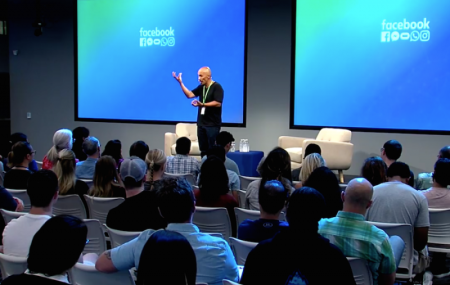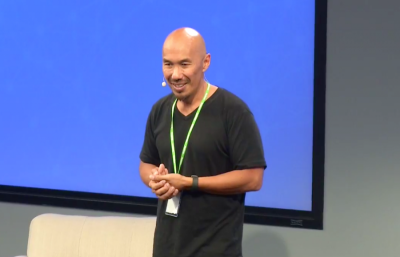Francis Chan Goes Into Detail With Facebook Employees on Why He Left His Megachurch

Bestselling author Francis Chan recently exposed his heart to Facebook employees, detailing why he left the helm of his thriving megachurch in California seven years ago.
Cornerstone Church in Simi Valley, California, was drawing around 5,000 people and growing in 2010. But Chan felt the megachurch he founded was not as God intended it to be.
"I got frustrated at a point, just biblically," Chan said during a talk at the Facebook headquarters in California last Thursday. "I'm going wait a second. According to the Bible, every single one of these people has a supernatural gift that's meant to be used for the body. And I'm like 5,000 people show up every week to hear my gift, see my gift. That's a lot of waste. Then I started thinking how much does it cost to run this thing? Millions of dollars!"
"So I'm wasting the human resource of these people that according to Scripture have a miraculous gift that they could contribute to the body but they're just sitting there quietly. … [T]hey just sit there and listen to me."
Moreover, he felt the church wasn't following God's command to love one another — attendees would simply greet each other for 30 seconds and mainly hang out in cliques once a week.

"I was like, 'God, you wanted a church that was known for their love. You wanted a group of people where everyone was expressing their gifts. … We're a body. I'm one member, maybe I'm the mouth. But if the mouth is the only thing that's working and … I'm trying to drag the rest of the body along, chewing on the carpet …"
His decision in 2010 to leave Cornerstone — which he started in his living room — came as a shock to many, including fellow evangelical pastors. In his announcement to the congregation at that time, he said he had been feeling a restlessness and stirring to let go of the megachurch and take on a new adventure.
He also indicated that he was wary of being "comfortable."
In his talk at Facebook last week, he offered more details about why he made that decision to leave, including a desire to get away from the pride he began to feel as his book, Crazy Love, became a bestseller and as he became a popular sought-after speaker.
"I freaked out during that time in my life," Chan recalled. "The pride … [going to] a conference and seeing my face on a magazine … and hearing whispers … and walking in the room and actually liking it."
At one point, Chan felt convicted and realized he became everything he didn't want to be. "Everything you (God) said you hated, that's me right now," he realized. "I gotta get out of here. I'm losing my soul."
Wanting to hide from "that weird celebrity thing," he also realized that he missed the old Francis Chan — "that stupid kid who fell in love with Jesus in high school and starts calling everyone in the yearbook that he knew to tell them about Jesus because he was so concerned about their eternal destiny."
Chan stressed to the Facebook group that God hates pride and that one can easily lose humility.
Today, Chan leads a house church movement in San Francisco called We Are Church. There are currently 14 to 15 house churches, he said, and 30 pastors (two pastors per church) — all of whom do it for free. Each church is designed to be small so it's more like family where members can actually get to know one another, love one another and make use of their gifts.
"We've got a few hundred people now and it costs nothing," Chan explained. "And everyone's growing and everyone's having to read this book (Bible) for themselves and people actually caring for one another. I don't even preach. They just meet in their homes, they study, they pray, they care for one another. They're becoming the church and I'm just loving it and realizing that these 30 guys [are] leading this and the women as well."
The people who join include "guys coming off the streets, out of prison to doctors and people that work here (Facebook) or Google," he said.
He's hoping to double the number of house churches every year so that in 10 years, there would be 1.2 million people in We Are Church. And, he reiterated, it's all free.
How would he compare the megachurch he once led to the current house church movement?
"This one guy put it like this: It's like being adopted rather than being in an orphanage," Chan said. "Church the way I was doing was like an orphanage. Here's just a bunch of kids with one leader. And rather than saying 'No, you know what, we're going to put you in a home and these guys are going to actually know you and love you and care for you.'
"It's just like family."
Recalling a sober moment he had while at Cornerstone Church, Chan said he baptized a kid from a gang but that kid later left though he was quite involved in the church.
"One of my friends asked him, 'Hey, how come you're not at Cornerstone anymore?' He said 'I didn't understand church. When I was baptized, I thought that was going to be being jumped into the gang where it's like 24/7 they're my family, because I didn't know it was just somewhere we attend on Sundays."
When Chan heard that, he said it made him sick.
"That makes me so sick that the gangs are a better picture of family than the church of Jesus Christ. I can't live with that. … We're going to do something different."
While Chan said he loves what he's doing now, he admitted that it wasn't easy and that his former gig at the megachurch was easier in some aspects.
"Some days I think it was a lot easier when I could just preach, go back and drive off in my car and leave all of them like I will today," he said to laughter among the Facebook employees. "I don't have to care for your issues, you know? … I'll never see you again.
"This is easy. But you have this circle here and you're in each other's lives and no offense, it's not this Facebook — I can just put up what I want about myself. That's kind of like the way church was. It's like let me just show you this one side on Sunday morning and let me just show you the best pictures of me and my greatest accomplishments.
"But when it's family, it gets messy. And you start finding out people's dirt. Just like you know about your brother and sister every Thanksgiving. It's messy because it's family. That's what Christ wanted. And so we fight for it. And it's been a blast."
As for what he does with all the money he earns through his bestselling books, Chan said he gives it all away.
He had prayed to God years ago, saying he was frustrated with the rich people in church who only give 5 to 10 percent of their money to church while living off millions. He prayed that God would either raise up a new generation of rich people who would actually live for eternity and give all their money away or make him rich.
"I'll give it all away to show that you're better than all of that," Chan remembered praying. So when he surprisingly made a million dollars the next year through his book and continued to make more over the following years, he signed it all over to a charitable gift fund "so that I can't even touch it. I can't even buy lunch with the money … I can only give to charity.
"It's been the best thing. Now I spend my days going and looking where are the needs around the world and how can I contribute to it?"





















